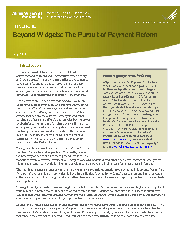In a normal market-based economic model, rational actors respond to incentives. Competition raises quality and lowers costs. Innovations can be disruptive to market participants but usually act to improve the product or service for consumers. Prices fall, value rises, and the economy expands or contracts based on what the market demands. Most functioning industries follow this path.
Health care in the United States is a notable exception. Costs remain stubbornly high, and quality remains lower than it should be. Consumers generally do not or cannot choose value. Providers, not consumers, usually drive demand for health care services. Employers and other purchasers of care should be able to exercise buying power to obtain better value, but often that power is limited—to employers’ great frustration. Competition does not reward the best providers, and weaker providers often remain in business.i In short, the normal rules of how a market- based economy should function seem not to apply to health care in the United States.


